#impermanence ghost
Explore tagged Tumblr posts
Note
Bai's hat in word of honor saying that fortune comes to those who meet him is true. I see him and I feel fortunate. He's a little fella. A perfect little guy. A lad. A friend, even.







A fortunate friend 🤍
#bai wuchang#hei wuchang#wuchang gui#white grim reaper#black grim reaper#impermanence ghost#changing ghost#word of honor#山河令#shan he ling#ghost valley#ask#my gifs
34 notes
·
View notes
Text
OOC Wuchang Gui bonus









Tumblr, this one is for you.
Wake up, time to go to work
Hoe Movements
Thank you to @feng-huli making that Wuchang Gui 12 minute supercut because it made actually finding screentime of his outfit much easier.
7 notes
·
View notes
Text
Ghost in the League
So I just read AGIT and yes all the lore drop is absolutely beautiful I took so many notes, but.
Look at this pair of outfit Danny has when they glitch through time:


Now look at red hooded ninja Jason and ninja/warrior Danny:


Do anyone see my vision??
PS.: they both have similar weapons. Some kind of east asian style straight sword/dao:


PPS: Danny didn't get to actually fight in the that outfit which is a bummer, and Jason's sword may or may not have turned into a katana somewhere between scenes.
#dpxdc#dcxdp#danny phantom#danny fenton#jason todd#halfway through making this post I realized I never finished the post about black and white ghost#but that's what this is about#they don't have a specific name in the league other than ghost#but sometimes people call them black and white impermanence (the grim reaper equivalent in Chinese folklore)#white ghost danny#black ghost jason
534 notes
·
View notes
Text



Actions speak louder than words, and Wuchang Gui didn’t need to use any words to reach Happy Ghost and quell his fury. Happy Ghost’s temper had gotten him into trouble before, such as with Tragicomic Ghost, and without Wuchang Gui to smooth things over, he would have likely died much earlier. The biggest challenge in Ghost Valley is survival, and Wuchang Gui helped Happy Ghost do that, all the while manipulating him, using him, and inspiring him to reach for something greater.


They laughed together, they glowered together, and they died together. Ghosts, forevermore.
WN Rarepair Tournament
Please consider each rarepair and vote for the ship you like the best / find the most interesting / that compels you the most / etc.


HuaXuan from Heaven Official’s Blessing (TGCF)
Characters: Hua Cheng x He Xuan
No propaganda submitted
Happy Ghost x Changing Ghost from Word of Honor / Faraway Wanderers
Characters: Happy Ghost x Changing Ghost / Old Meng
Submission: Two horrible men in love
[Please be kind and respectful in the notes. Anti-Propaganda is NOT allowed.]
#wuchang gui#kaixin gui#impermanence ghost#happy ghost#word of honor#ghost valley#propaganda#shipping#poll#my gifs
4 notes
·
View notes
Text







The River's Always Been Here.
22x32
Acrylic and water on raw canvas.
#milwaukee#fleming#symbol#symbolism#painting#figure#figurative#acrylic#fine art#art#river#river spirit#riverbank#river edge#mystic#mystical#spirit#ghost#water#water's edge#permanence#nature#impermanence
9 notes
·
View notes
Text
All the things that happened to us Are like roaring oceans. When the awareness of life Turns into the awareness of being alive, We become what we write about, Sharing each other's words to tell about. We turn into ghosts like the falling leaves. Ending and letting go are not the same. - Laura Chouette
#Poetry#ExistentialPoetry#AwarenessOfLife#LifeAndDeath#RoaringOceans#FallingLeaves#LettingGo#Change#PoeticThoughts#SoulfulWriting#Ghosts#LifeTransitions#PoeticReflection#EmotionalPoetry#WritingAboutLife#TheEndAndTheBeginning#Uncertainty#PhilosophicalPoetry#Impermanence#PoemOfTheSoul
2 notes
·
View notes
Text
i dont have anything coherent to say but im thikning about ghosts and the concept of immortality and the nature of death and the way that moving on scares and upsets them and they all grieve so thoroughly and the dimension 20 quote "is the only amount of time that would make your life worthwhile forever?" or w/e and "your first breath signs the deed to one day have your last" and the taz "how would you like to live forever" "I'd hate it, shut the fuck up" and thomas' "eventually, no one will come" and "the love was there, it didn't change anything but it was there" like. do you get it. do you get it.
#is anybody hearing me#what is that d20 quote specifically i cant remember#is it from neverafter with the baron of bricks? or am i making it up#the one thats like 'is the only length of time to make your life worth something forever?'#am i stupid#anywayyyy ill sob about the impermanence of it all#d20#bbc ghosts#taz balance
32 notes
·
View notes
Note
Count Dracula: Come into my castle. It is extremely normal and definitely full of alive people. This is for our normal transaction. It shall last a week, tops. You will leave behind some of the happiness you bring, not blood.
Countess Carmilla(?): Let me couchsurf in your castle for a while. Mine's not destroyed along with my roots after my premature demise. I absolutely have a place I call home and a name and am definitely not roaming with the black parade like a restless ghost in my impermanence :) Nothing gay will happen next.
Jonathan and Laura: Hmm. Sounds plausible.
[Some Months Later]
Jonathan and Laura: Our blood is missing and the queer dreams are constant
#in their defense neither of them are aware that they are in the books Dracula and Carmilla#we can’t blame them#dracula#carmilla#jonathan harker#laura
471 notes
·
View notes
Note
Who do you think Changing Ghost's favorite Ghost is?
Interesting question, thanks for the ask! 😺 To start with, his favorites would likely be those that follow him. He wants to be Ghost Valley Chief, and favoring those who are helping him achieve that goal simply makes sense.
Of those, the mostly likely to be the favorite is Bai Wuchang. The desperation Wuchang Gui has in pleading for his life, and the risk he's taking in doing so... it contrasts quite a bit with his anger and irritation when asking for a cure for Hei Wuchang.


After losing Bai Wuchang, I think that his favorite would become Happy Ghost. There may be some tension regarding how following Wuchang Gui's plan has made their situation worse and worse (Happy Ghost predicted that working with Zhao Jing would be a bad idea), but Happy Ghost also has the most to gain from its success. He is both the easiest and most challenging to manipulate, and I think Wuchang Gui would be entertained by that. Then, with the way Happy Ghost looks at him...

Whether through how he dresses or how he acts, Wuchang Gui appears to like holding people's attention. Happy Ghost can give him that in a way that Hei Wuchang doesn't, and I think that Wuchang Gui would appreciate that.

#wuchang gui#changing ghost#impermanence ghost#kaixin gui#hei wuchang#bai wuchang#white grim reaper#black grim reaper#happy ghost#word of honor#山河令#shan he ling#ghost valley#my gifs#ask
12 notes
·
View notes
Text
A Guide to the Chinese Underworld (and what it isn't)
As many FSYY and fox posts as there were on my blog, I am actually a huge fan of the Chinese Underworld mythos. Mostly because I was once a morbid little kid that loved reading about the excavations of ancient tombs, and found the statues depicting hellish torture in the Haw Par Villa "super cool".
Apart from the aesthetics, the history of its evolution is also fascinating. Most of us, Chinese or not, only know the most popular version of the Underworld——the "Ten Kings" system, yet that isn't always the case. So today, I'll start off with a short summary of that.
In pre-Qin era, there was already this generic idea of a "Realm of the Dead" called the Yellow Spring, Youdu, or Youming, but we know very little about it.
Then, in the Han dynasty, two ideas start to emerge: 1) the Underworld is a bureaucracy, 2) the God of Mt. Tai ruled over the dead.
This early bureaucracy might not function as an agent of punishment; the main focus was on keeping the dead segregated from the living so they wouldn't bring diseases and misfortune to the latter, as well as using those ghosts to enforce collective punishments upon people for their lineage's wrongdoings while they were still alive.
Post-Han, after Buddhism entered China and took root, its idea of karmic punishments and reincarnation and the figure of King Yama was merged with folk and Daoist ideas of the Underworld bureaucracy, and, came Tang dynasty, resulted in the "Ten Kings" system that first appeared in Dunhuang manuscripts.
It was very rudimentary and far from well-established, as seen in Tang legends, with some adopting the Ten Kings system, some sticking to the Lord of Mt. Tai and some favoring King Yama, and overall little agreements on who's in charge of the Underworld.
But the "Ten Kings" system would become the mainstream version from then onwards, used in Ming vernacular novels and made even more popular by folk religion scrolls like the Jade Records (Yuli Baochao).
As such, most points in the following sections will be based on the fully matured "Ten Kings" system of the Underworld, as seen in the Jade Records and JTTW.
What happens when you die?
(This is a fictionalized walkthrough of the posthumous fate of souls under the "Ten Kings" system. I try to stick to the very broad progression outlined in the Jade Records, but many creative liberties are taken on the details.)
Let's say there's a guy named Xiao Ming, and he had just died of a heart attack. Bummers. What now?
Well, the first thing he saw would be the ghost cops.
There isn't really an unanimous agreement on who these ghost cops are: they may be a pair of ghosts in white and black robes, wearing tall hats (Heibai Wuchang), they may have the heads of farm animals (Ox-Head and Horse-Face), or they can just be generic ghost bureaucrats. For convenience's sake, let's say it was the first scenario.
"Who are you guys and where are you taking me?"
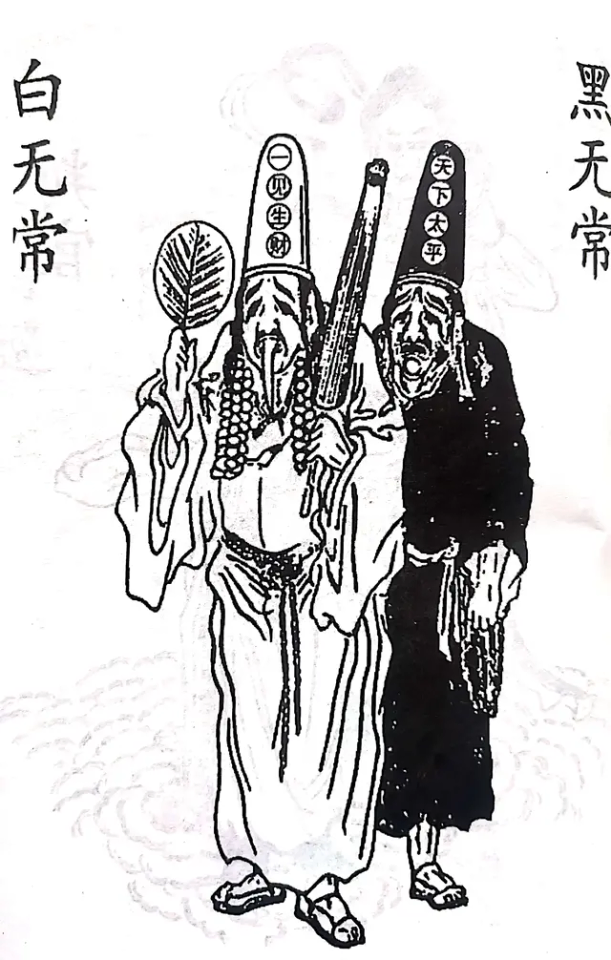
"Glad you asked!" The taller ghost cop, being the cheerful one of the pair, replied. It wasn't very reassuring, considering that his tongue was dangling out of his mouth way further than it should. "I'm the White Impermanence, my sour-looking colleague here is the Black Impermanence, and we are taking you to the City God's office."
This City God, a.k.a. Chenghuang, is just like how it sounds: the divine guardian of a city, who also pulls double duty as the head of the local Dead People Customs Office. They are usually virtuous officials deified posthumously, and in JTTW, they fall under the category of "Ghostly immortals", together with the Earth Gods a.k.a. Tudi.
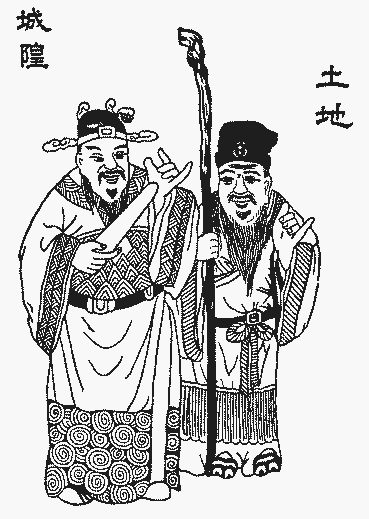
So Xiao Ming went with the two ghost cops——not like he had much of a choice, made his way through the long queue at the City God's office, and was now standing in front of a gruff old magistrate in traditional robes.
"Name?"
"Wang Xiao Ming."
"Age and birth dates?"
"21, April 16 2003…"
After he was done asking questions, the City God flipped through his ledger, then picked up a brush, ticked off Xiao Ming's name, and told him to go get his pass in the next room. More waiting in a queue. Wonderful.
"I never heard anything about needing a pass to get to the Underworld," the girl in front of Xiao Ming asked the ghost cops, who were standing guard nearby. "Is this a new policy or something?"
"Yeah. In the old days, we'd just drag y'all straight to the Ghost Gate." The ghost cop in black said, then muttered to himself, "Fuckin' paperworks and overpopulation, man…"
(This "Dead People Passport" thing was popularized in the middle-to-late Ming dynasty, as shown by the discovery of such documents inside tombs in southern China. )
(It might have evolved from similar passes to the Western Pure Land in lay Buddhism that recorded their acts of merits. Which, in turn, might be traced back to the "Dead People Belongings List" of Han dynasty, to be shown to Underworld bureaucrats so that no one would take away the dead's private property down there or something.)
Anyways, after he received his pass, Xiao Ming departed together with the rest of the bunch, to be led to the Ghost Gate. It was like the world's most depressing tourist group, where instead of tour guides, you got two ghost cops in funny hats, and the only scenery in sight was the desolation of the Yellow Spring Road.
They weren't the only travellers on the road, though. Xiao Ming noticed other groups moving in the far distance, behind the fog and the flickering ghostfire, led by similar figures in black and white.
It made a lot of sense; realistically, there was no way two ghost cops could fetch hundreds of thousands of dead people all by themselves.
(SEA Tang-ki mediums believed there were multiple Tua Di Ya Peks——Hokkien name for the Black and White Impermanences, working for different Underworld Courts.)
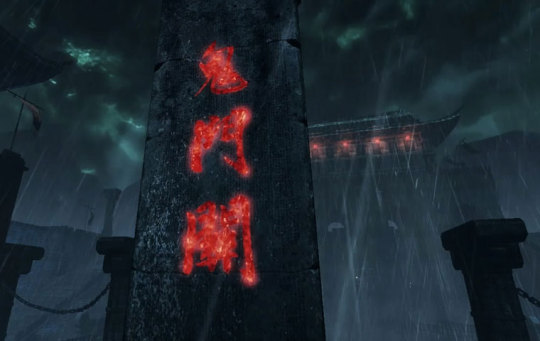
At last, the Ghost Gate stood in front of Xiao Ming, guarded by two towering figures. Normally, they'd be Ox-Head and Horse-Face, like what you see at Haw Par Villa's Underworld entrance.
However, older Han dynasty works like Wang Chong's 论衡·订鬼 also mentioned two gods, Shenshu and Yulei, as guardians of the Ghost Gate, who would use reed ropes to capture malicious ghosts and feed them to tigers, making them possibly the earliest incarnation of "Gate Gods".
So here, they were what Xiao Ming sees, standing side by side like proper doormen, silently watching herds of ghosts being funneled through the entrance.
The place was more crowded than a train station during the CNY Spring Rush; the ghost cops had already said their quick goodbye and left to fetch the next group of dead people, leaving the resident officials of the Underworld proper to maintain order and quell any would-be riots.
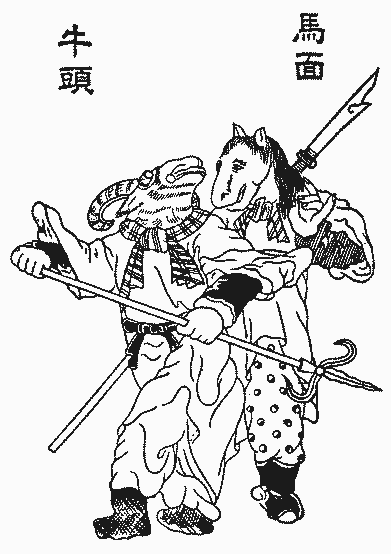
Now you started seeing the Ox-Head and Horse-Face guys, poking at unruly ghosts with their pitchforks and dragging away the violent ones in chains. Among their ranks were other monstrous beings, blue-faced yakshas and imps, but also regular dead humans who look 100% done with their jobs, like the lady who stamped Xiao Ming's pass when it was finally his turn.
After this point, Xiao Ming had entered the Underworld proper, and his next destination would be the First Court, led by King Qin'guang. Here, his fate should be decided by what is revealed in the King's magical mirror.
If Xiao Ming was a good guy, or someone who had done an equal amount of good and bad things in life, he'd be sent straight to the Tenth Court for reincarnation. However, if the mirror, while replaying his life events, had displayed more evil deeds than good ones, he'd be sent to one of the 2nd-9th Courts for judgment and then punished inside the Eighteen Hells.
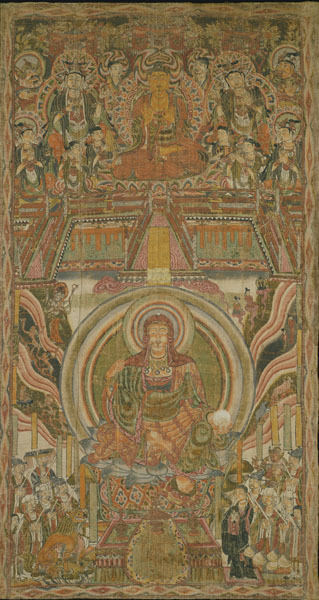
Each of the Ten Kings was also assisted by ghostly judges. Many of them were righteous and just officials in life who had been recruited into the Ten Courts posthumously——Cui Jue from JTTW is one such example, while others were living people working part-time for the Underworld, like how Wei Zheng, Taizong's minister, works part-time for the Celestial Bureaucracy in JTTW.
We decide to be nice to Xiao Ming, so, after reliving some embarrassing childhood incidents and cringy teenage phases in front of a bunch of dead bureaucrats, he was found innocent and sent to the Tenth Court.
The queue here was almost as long as the First Court's, stretching on and on alongside of the banks of the Nai River. King of the Turning Wheel made his judgment without even lifting his head when it was Xiao Ming's turn:
"Path of Humans, male, healthy in body and mind, ordinary family. Next!"
Exiting the Tenth Court building, Xiao Ming saw the Terrace of Forgetfulness, standing tall before six bridges, made of gold, silver, jade, stone, wood, and…some unidentified material. Before he could get a good look at them and the little dots moving across those bridges, he was hurried into the Terrace by the ghostly officials.
Now, both JTTW and the Jade Records mention multiple bridges across the Nai River. In the former, there is 3, and the latter, 6. The bridges made of precious materials are for people who will reincarnate into better lives, as the wealthy, the fortunate, and the divine, while the Naihe Bridge is either the common option or the terribad shitty option.
However, the Naihe Bridge proved to be so iconic, it became THE bridge you walk across to reincarnate in popular legends.
Anyways, back to Xiao Ming. He found himself standing in a giant soup kitchen of sorts, with an old lady at the counter, scooping soup out of her steaming pot and into one cup after another.
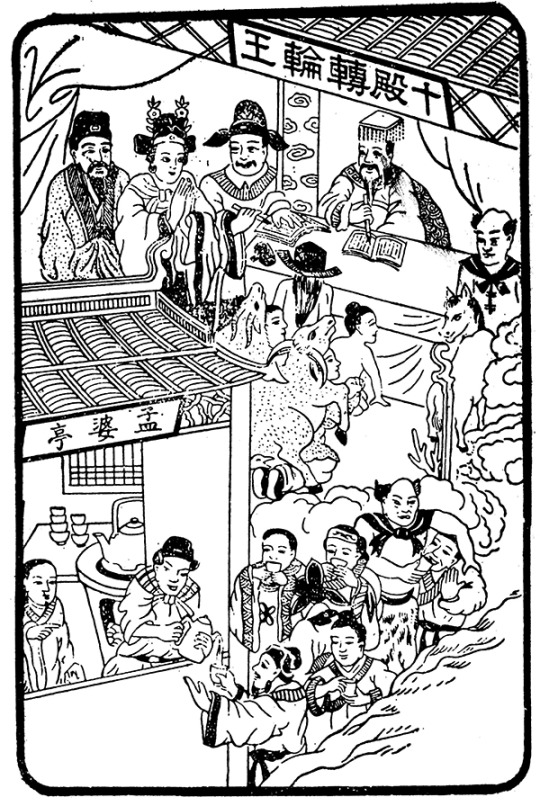
This is Mengpo, the amnesia soup granny; according to the Jade Records, she was born in the Western Han era, and a pious cultivator who thought of neither the past nor the future, only knowing that her surname was Meng.
Made into an Underworld god by the Jade Emperor, she cooks a soup of five flavors that will wipe the memory of the dead, making sure they do not remember any of their past lives once they reincarnate.
It tastes awful. Like what you get after pouring corn syrup, coffee, chilli sauce, lemon juice and seawater into the same cup.
Such was Xiao Ming's last thought, as he gulped down the soup, and then he knew no more.
Things you should know about the Chinese Underworld:
1. It's not the Christian Hell.
Rather, the Chinese Underworld functions somewhat like the Purgatory, in that there are a lot of torment, but the torment's not eternal, however long the duration may be. Once you finish your sentence, you get reincarnated as something else, though that "something else" is not a guaranteed good birth.
Other people can also speed up the process via transferring of merits: hiring a priest/monk to chant sutras and perform rituals, for example, or performing good deeds in life in dedication to the dead, or they can pray to a Daoist/Buddhist deity to save their loved ones from a dreadful fate.
Interestingly enough, a thesis paper I read mentions that, whereas Buddhist salvation from the Hells was based on transference of merits——you give monks offerings and pay them to chant sutras, so they can cancel out the sinners' bad karma with good ones, Daoist ideas of salvation tend to involve the priest going down there, sorting it out with the Underworld officials, and taking the dead out of the Hells themselves.
(The paper also stops at the Northern-Southern and Tang dynasties, so the above is likely period-specific.)
2. Nor is it run by evil demons.
Underworld officials are not nice guys and look pretty monstrous and torture the sinful dead, but they are not the embodiment of evil. Rather, the faction as a whole is what I'd call Lawful Neutral, who function on this "An Eye for An Eye" logic, where every harm the sinner caused in life must be returned to them, in order for their karmic debts to be cleansed and move on to their next life.
They can absolutely be corrupt and incompetent and take bribes——Tang dynasty Zhiguai tales and Qing folklore compendiums featured plenty of such cases, but that's a very mundane and human kind of evil, not a cosmic/innate one.
This is just my personal opinion, but if you want to do an "evil" Chinese Underworld? It should be a very bureaucratic evil, whose leaders are bootlickers to the higher-ups, slavedrivers to their rank-and-file workers, and bullies who abuse their power over regular dead people.
Not, y'know, Satan and his infernal legions or conspiring Cthulu cultists.
3. The Ten Kings are not Hades.
Make no mistake, they still have a lot of power over your average dead mortal. But in the grand scheme of things? They are the backwater department of the pantheon, who only show up in JTTW to get pushed around and revive the occasional dead people.
When Taizong made his trip to the Underworld, the Ten Kings greeted him as equals——kings of ghosts to the king of the living. If they see themselves as equal in status to a mortal emperor, then, like any mortal emperors, they are subordinate to the Celestial Host, and the balance of power is not even remotely equal or in their favor.
Also, it isn't said outright, but under the Zhong-Lv classification of immortals JTTW is using, Underworld officials will likely be considered Ghostly immortals, the lowest and weakest of the five types, much like Tudis and Chenghuangs.
Essentially: they are ghosts that are powerful enough to not reincarnate and linger on and on, spirits of pure Yin as opposed to true immortals, who are beings of pure Yang.
It's pretty much the shittiest form of immortality, the result you get when you try to speedrun cultivation (the Zhong-Lv text also made a dig at Buddhist meditation here), and if they don't reincarnate or regain a physical body, there is no chance of progressing any further.
Oh, and fun fact? In the Song dynasty, commoners and literati elites alike believed that virtuous officials in life would get appointed as ghostly officials in death.
However, the latter viewed it as a punishment. Which was strange, considering how they still held the same position and the same amount of authority, just over dead people instead of living ones, so there should be no big losses, right?
Well...it was precisely the "dead people" part that made it a punishment. See, a lot of the power and prestige they had as officials came from the benefits they could bring to their families and kins and native places, as well as the potential wealth and reputation bonuses for themselves.
A job in the Dead People Supreme Court would give them the same workload, but with none of those benefits. Since all the dead people had to reincarnate eventually, they couldn't have a fixed group as their power base, or keep their old familial ties and connections. At most, they could help out an occasional dead relative or two.
Like, working for the Underworld Courts was the kind of deadend (no pun intended) job not even living officials wanted for themselves in the afterlife. That's how hilariously sad and pathetic they are.
4. In JTTW at least, they aren't even the highest authorities of the Underworld.
That would be Bodhisattva Ksitigarbha, who is technically their boss, though he seems to be more of a spiritual leader than someone who is actually involved in running the bureaucracy.
Which makes sense, since he has sworn an oath to not attain Buddhahood until all Hells are empty, and his role is to offer relief and salvation to the suffering souls, not judging and punishing them.
Now, historically...even though Ksitigarbha in early Tang legends was still the savior of the dead, he seemed to be unable to interfere with the judicial process of the Underworld, merely showing up to take people away before they were judged by King Yama.
However, in the mid-Tang apocryphal "Sutra of Bodhisattva Ksitigarbha" (地藏菩萨经), he had evolved into the equal of King Yama, with the power of supervision over his judgements. By the time the Scripture on the Ten Kings came out, in artistic depictions, the Ten Kings had become fully subservient to him.
5. Diyu usually refers to the prison-torture chamber part, not the courthouse, nor is it the entirety of the Underworld.
And for the majority of souls that haven't committed crimes, they'll only see the courthouse part before they are sent to reincarnation. That's why I personally don't like, or use the name Diyu for the Chinese Underworld: I prefer the term Difu ("Earth Mansions"), which encompasses the whole realm better.
Also: even though historical sources like the Scripture on the Ten Kings and Jade Records seem to suggest that the dead were just funneled through this Courthouse-Prison-Reincarnation pipeline with no breaks in between, in practice, that isn't the case.
According to popular folk beliefs, after the dead were done with their trials/sentences, they stayed in the Underworld for a period of time and led regular lives, while functioning as ancestor spirits and receiving offerings.
Which would imply that the Underworld had a civilian district of sorts, populated by regular ghosts, making the whole realm even less of a direct Hell/Purgatory equivalent.
6. It is located in a different realm, but still part of the Six Paths and doesn't exist outside of reality.
In Buddhist cosmology, like the Celestial Realm, the Underworld is part of the Realm of Desires and thus subject to all the woes of samsara.
The pain and misery of the Path of Hell may be the worst and most obvious, but becoming a celestial being isn't the goal of serious Buddhists either: despite all the pleasures and near-infinite lifespan they enjoy, they are not free from samsara and will eventually have to reincarnate.
So if, say, the world is being destroyed at the end of a kalpa, all beings of the Six Paths will perish alongside it, leaving behind a clean slate for the cycle to start anew. The dead won't all end up in the Underworld and face eternal damnation.
7. The Black and White Impermanences would not appear in the Underworld pantheon formally until the Qing dynasty.
The concept that when you die, you get fetched to the Underworld by petty ghost bureaucrats is already well-established in Tang legends, but these were just generic ghost bureaucrats in all sorts of colorful official robes, with yellow being the most common color.
The idea of there being two specific psychopomps in black and white would only become popular in the Qing dynasty. Mengpo is kinda similar: although she existed before the Ming-Qing era as a goddess of wind, venerated by boatmen, her "amnesia soup granny" incarnation came from the Jade Records.
#chinese mythology#chinese folklore#chinese underworld#diyu#chinese religion#cw: death#hell#underworld#journey to the west#I'm lazy so if you want a “work cited” list#just dm me
2K notes
·
View notes
Text
I think hex maniacs in pokemon are so fucking funny because like.
Imagine you’re walking thru somewhere obviously haunted n u see some kid who looks like she hasn’t slept since the womb muttering under their breath. and you fight them ofc bcause you gotta socialize your mons. And they send out LITERAL GHOSTS half of which can place lethal curses on you and the other half still quite intimidating because of the marginally less lethal curses.
Of course you’d call them a maniac.
But imagine being that sleep-deprived ghosty shitheel for a sec.
You grow up somewhere where ghosts are a pretty common pest. So, y’know, from a pretty young age you learn to call death’s bluff on account of its impermanence. Who cares if this mortal body fails, you’ll probably just collapse and turn into a litwick or yamask or something. Some of these pests, like shuppet, have metaphysical diets, feasting on emotions or some such. Your parents are arguing? Go entreat a shuppet and they mellow out immediately. So not only do you not care about dying all that much, you can probably also feed all your problems to one ghost or another.
Like, I’d be a sleep deprived mess who doesn’t care how hard my dog play-bites either if I grew up like that.
763 notes
·
View notes
Text
Revolutionary Girl Utena: Gender in Context
beneath the cut, I discuss the RGU's portrayal of gender in the context of 1990s Japan.
in Ikuhara's interview with Mari Kotani, he stated that in traditional Japanese society, "prince" meant "patriarch." the same is true in Western societies--there was a time when a prince would be an heir to a royal line. by 1997, this meaning had died out of large parts of the world. even the association between princes and traditional masculinity was fading. Saionji, the weakest, most pathetic man in the show, is a parody of historical Japanese masculinity, with his kendo and his blatantly regressive beliefs about women.
in RGU, prince may still mean patriarch, but in a far more subtle fashion. Ikuhara and Kotani discussed the changing expectations for men in the latter half of the 20th century--it became gauche to fight over a woman with one's brawn, so instead, power struggles were played out in the arena of looks and sex appeal. one can see this reflected in the character Akio, whose power as a prince arises from his ability to turn "easy sensual pleasure based on dependency" "into a selling point with which to control people."
Akio has his moments of showboating masculinity, but when preying on Utena, he operates by making himself seem non-threatening and soft.
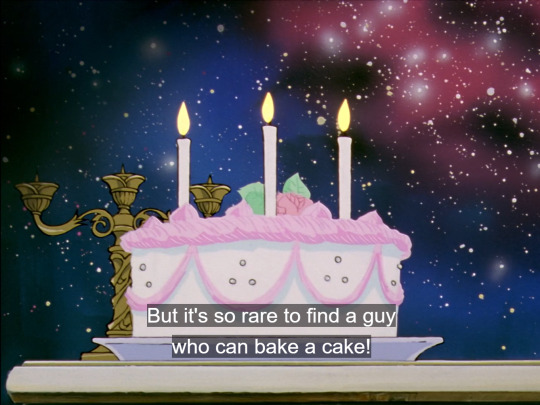
not only that, but he purports to want to allow students to express their individuality and thus approves of Utena's masculine form of dress. this is a front--by the end of the show, he's telling Utena that girls shouldn't wield swords. thus, through Akio's character, the show argues that traditionalist patriarchy in Japan isn't gone, but instead has only been papered over with false progressivism.
with all that said, there seems to be more to the character. he's taken the family name of his fiance, Kanae, and whatever material power he has in the school is dependent upon her family. in Japanese society, this is considered a humiliating position to be in, something that only a shameless man would do. the show never gives the audience any insight into how Akio feels about this--is he unbothered entirely, or are his actions against the Ohtori family an expression of his repressed anger? does he harm the children under his care to compensate for his humiliation?
this aspect of Akio's character may seem irrelevant in light of the larger, immaterial social forces at work in the show. however, I would argue that it was included for a reason. Akio, despite his status as ultimate patriarch of Ohtori, is in fact a highly emasculated character, to the point where lead writer Enokido even said that he is driven by an infantile mother complex.
to explain why Akio was portrayed this way, we have to discuss Japanese history. the nation suffered a major defeat in WWII and was forced to accept whatever terms the United States laid out for it. for an examination of how the Japanese have never truly processed those events and have plunged into modernity with reckless abandon, I recommend Satoshi Kon's Paranoia Agent. to sum it up briefly, in a very short period, the nation regained its economic footing, and by the 1980s had the largest gross national product in the world. this economic boom may have allowed Japan to maintain a sense of sovereignty, dignity, and power, but it was inherently fragile.
the infamous "bubble economy" lasted from 1986 to 1991. during this time, anything seemed possible; financial struggles appeared to be a thing of the past, and capitalist excess reached new heights. the ghosts of this period can be felt across Japanese media; for instance, think of the final shot of Grave of the Fireflies (1998), where the two dead children look down on Kobe, glowing an eerie green to imply its impermanence. the abandoned theme park from Spirited Away (2001) is explicitly referred to as a leftover from the previous century, when many attractions were built and then tossed aside in a few short years.
the bubble popped in 1992, leaving an entire generation feeling cheated. the bright futures they'd been promised, which had actually materialized for their parents and older siblings, had been lost to them overnight. economic crises are often accompanied by gender panics. to quote from Masculinities in Japan, "The recession brought with itself worsening employment conditions, undermining the system of lifelong employment and men’s status of breadwinners in general. The unemployment rate was rising, and although it never reached crisis levels, men could no longer feel safe in their salaryman status. Their situation was further complicated by the rising number of (married) women entering the workforce."
with this in mind, Akio's character can be taken as a representation of masculinity in crisis in 90s Japan. he's forced to rely on women for his position in life and has failed to save his only relative, Anthy. he tries to escape his misery through hedonism, perhaps an allegorical representation of how men tried to maintain their old standard of living after the economic bubble burst.
but of course, Akio is not the main character of RGU--the story is about girls. mangaka Yamada Reiji discussed the series in the context of the 90s, stating the following:
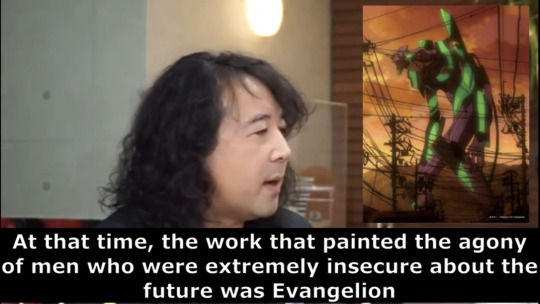
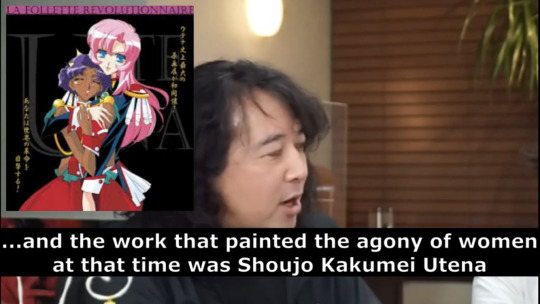
while I opened this essay by discussing the prince, the same points could be made about the princess. despite the increasing irrelevance of royalty, princess is still an important concept. how does it relate to the socioeconomic landscape of the 90s?
in Yamada's view, RGU is full of relics of the 80s; for instance, the figure of the ojou-sama, an entitled young woman who never lifts a finger for herself. during the economic bubble, it was increasingly common for women to be entirely taken care of by the men in their lives. Yamada names Nanami as a clear ojou-sama type character: she weaponizes her femininity, demanding to be rescued, doted on, and served.
however, by 1997, the ojou-sama could no longer expect to get what she wanted. from the 80s to the 90s, the percentage of women in the workforce increased around 15%; it was no longer viable for most women to be "kept" by their families. as the men experienced the humiliation of not being able to provide for their wives and children, women were undergoing a disillusionment of their own.
Yamada blames Disney for creating the ideological structure which led women astray. obviously, the company is known for its films about princes rescuing princesses. in Yamada's recounting, during the 80s, the company was infiltrating Japan through its theme parks as well; across the country, Disneylands were opening up, and people were buying into the escapism the corporation offered. Japan, as America, became a country of eternal children. its people were waiting for a prince to appear and save them.
but fairy tales can't stave off reality forever. Yamada claims that RGU embodies the rage of young women who woke up one day and realized that they had been raised on a lie. this anger pervades the work from beginning to end.
though RGU was created in a particular social context, its lessons can be extrapolated to any time and place. as the first ending tells us:
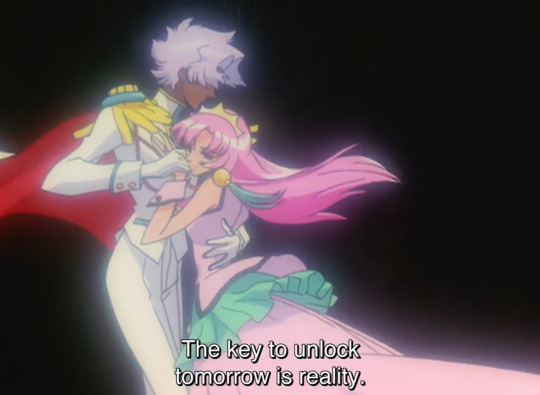
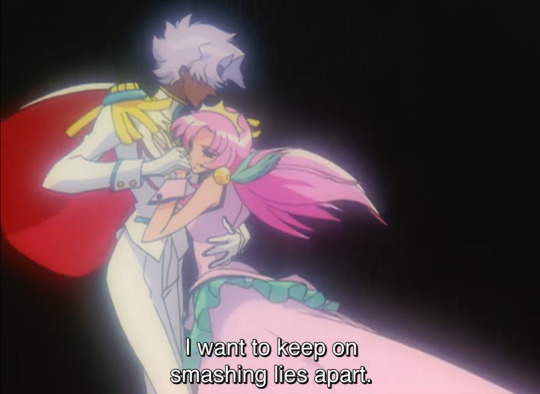
I hope this essay helped provide more context for the series. thanks for reading!
#rgu#commentary#revolutionary girl utena#this was originally a part of another essay but i revamped it and added a lot more detail
891 notes
·
View notes
Note
can we pls get a continuation of yan!Xiao and his escort!darling? I’m begging and gnawing at the bars of my enclosure urjbderobjg
warnings : yandere themes, unhealthy relationships, oral (reader receiving), gender neutral reader (no description of genitalia). author's note : ngl this one made me think about this concept but modern!au with nerd xiao.... also i, in fact, did not learn how to write smut without sounding awkward 💀 although xiao is awkward so it kinda helps masking it lol

your world is small. a single room, a single bed, a single flickering lantern casting its glow against silk-draped walls.
a place meant for passing comfort, for whispered confessions lost to the night, for hands that do not linger and lips that do not seek to stay. it is a world built on transience, on impermanence.
the air is thick with something unspoken—anticipation, uncertainty, a quiet, pulsing dread that curls beneath your ribs as you step inside.
you have done this before. countless times. different faces, different voices, different hands reaching for you with intentions that blur together into something you no longer bother distinguishing.
but this is different. because the man who waits for you does not belong here.
he stands near the window, the faint outline of his figure illuminated by the moonlight beyond. his posture is stiff, hands curled into loose fists at his sides, as if the very act of being in this room is something unbearable.
and yet, he is here. waiting for you.
his gaze lifts when you enter, sharp and piercing, cutting through the dimness like the edge of a blade. gold eyes, striking, inhuman, unreadable.
you falter. just for a second. just long enough for something inside you to whisper that this was a mistake. that you should turn around, walk out, forget you ever saw him.
but you don’t. because his gaze does not waver.
because there is something in the way he looks at you—something steady, possessive in a way that makes your stomach tighten.
he has no reason to be here. you know this instinctively. he does not look at you the way your usual clients do.
there is no hunger in his eyes, no leering smirk, no feigned warmth meant to coax you closer. no, this is different. because he already knows you.
the silence stretches between you, thick and suffocating, until you find your voice, softened into something careful. “are you sure that—”
his eyes flicker, and you swallow the rest of your question, because the answer is obvious.
“yes.”
you step further inside, the sound of the door clicking shut behind you impossibly loud in the stillness. his gaze does not stray, does not hesitate, does not so much as blink as you move toward him.
words are not spoken, but they hang between you, thick and suffocating, wrapping around your throat like a silken noose.
xiao stands before you, unmoving, eyes burning with something you do not want to name—a pause, thin as a thread, fragile as glass.
you could sever it now. laugh, step away, remind him that he is nothing more than a visitor in your life, that his presence does not dictate your choices, that he does not hold power here.
you should. you know you should. but you don’t. and that is your first mistake that night.
he tells himself he’s never been one for indulgence, even as his fingers dig into the plush of your thighs, as his lips ghost over your skin, reverent in their worship. this is not indulgence—this is duty, a necessity.
he repeats that to himself, over and over, a silent mantra beneath his breath. that is what he tells himself as he parts your legs, as he kneels between them like a man at prayer.
your pulse is frantic beneath his lips, thrumming just beneath the surface, against your throat, against your collarbone, against the place where his mouth lingers just above the swell of your chest.
he has always been able to hear it, to feel the fragile, human rhythm of you, but never like this. never with your skin burning beneath him, never with your body pliant in his hold, never with the weight of your breath catching on the edge of his name.
you shift beneath him, a restless, quiet movement, and it is only then that he realizes how still he has been, how tightly wound.
he exhales slowly, forcing himself to move, to press another kiss against the dip of your shoulder, to let his fingers ghost over the warmth of your ribs.
it is meant to be a cleansing. that is what he tells himself. that is what he told you. that this is not indulgence, that this is not selfish.
that he only seeks to rid you of the filth that lingers—of the hands that touched you before his own, of the ghosts that still haunt your skin.
and yet, when he presses his lips lower—when his breath fans over your stomach, when his fingers tighten just slightly at the soft curve of your hips, when he watches your breath hitch as he dips lower, lower, just above where you need him most—he knows this is more than that.
this is not protection. this is not duty. this is possession.
his hands slide along the backs of your thighs, slow, deliberate, spreading you open for him with the care of something fragile, something meant to be cherished.
he exhales against the heat of you, drinking in the sight of your hole, the way you twitch beneath his touch, the way you are already aroused for him.
a shudder runs through him.
“i need to rid you of this,” he murmurs, voice thick, low, something unsteady beneath the weight of his own restraint.
and then, quieter, softer, as his lips brush the edge of your entrance, “you deserve to be free from harm.”
you deserve to be pure. the first taste is an absolution.
his tongue flicks out, catching the wetness that beads at your entrance, and the sound you make—small, breathless, needy—sends a sharp spike of heat curling in his gut.
he licks again. slow. measured. calculated.
your hips jolt slightly, instinctively, and his fingers tighten their grip, holding you steady, keeping you still beneath him as his tongue works a slow, sinful path up the length of you.
xiao does not consider himself a greedy man.
and yet, when his lips are already messy, when your body shudders at the languid press of his tongue, he knows there is no going back.
he needs more.
your moans are quiet, but they echo in his skull like a war drum. you are divine, and xiao is a man with no gods left to worship.
his hands tighten against your thighs as he licks, as he sucks, as he buries himself in you like a man drowning in his own desire.
he does not come up for air. he does not stop. his pace is slow but relentless, a steady, intentional torment that keeps you teetering at the edge, your fingers curling in his hair, your thighs twitching against the cage of his arms.
you are close. he can feel it in the way your body tenses, in the way your breath turns ragged, in the way your hips twitch as if to meet him, to chase what he is too cruel to give just yet.
and he could.
he could let you fall apart beneath him. he could let you come, let you shatter against his tongue, let you sob his name into the space of the room, into the dim, lantern-lit air.
but that is not enough. not yet.
because when you do—when he lets you break beneath him, when he lets you unravel in his grasp—he needs you to understand.
that this is not indulgence. that this is not duty. that is devotion.
#xiao x reader#yandere xiao x reader#xiao x you#xiao smut#genshin smut#genshin impact smut#genshin impact x reader#yandere genshin impact x reader#yandere x reader#genshin impact#genshin x reader#yandere x you#yandere genshin#yandere genshin impact#yandere genshin x reader#yandere#genshin#˗ˏˋ꒰ writing ꒱
169 notes
·
View notes
Text
To the ‘themes I am picking up on in Veilguard’ list, let's go ahead and add what I have a sneaking suspicion will actually turn out to be The theme:
— the world has changed and can never be as it was again.
— I have been changed and can never be who I was again.
— in this simple unavoidable truth there is endless grief and endless hope.
And I… may be getting a bit emotional about it haha. Let me show my work a bit:
if da:o is a game about people who are already dead or half ghosts in some form (through societal forces, psychologically, functionally, literally, in body, through the joining etc.) coming together anyway to save the world from being swallowed by total nihilism and despair (symbolized by the blight) through the power of love and friendship and also this sword/potential heroic sacrifice that I found, da2 is a game about people who have lost their homes and been set adrift finding and building new homes in each other (while completely failing to save the world. also through the power of love and friendship. as well as years of petty bickering <3 we must imagine kirkwall if not happy then worth having been because the love was there the love was there and that's the only sanctifying force we can ever have in this doomed world and city of ours), and da:i is a game about old stabilizing-but-unjust comfortable lies vs. disruptive but potentially liberating uncomfortable truths, and the power of friendship to help us distinguish the one from the other and navigate through them...
folks… I'm starting to think that veilguard might be a game specifically about moving towards recovery and acceptance after trauma — about how even in this flawed, severed, scarred state, what is here right now is worth loving and worth caring for. even in an imperfect and impermanent world and self, there is worth and joy. and of course the first real tragedy — and threat — of Solas is that he just cannot find it in himself to accept this and move on, to let go of what was, the regret won’t let him go or he won’t let go of it. which means that even though on the surface it’s Elgar’nan and Ghilan’nain (and the will to subjugate and violate they represent) who are the main villains, the real antagonistic force in this story beneath that is the Dread Wolf’s despair. A despair Rook must make an answer to by the end of the game, one way or another, compassionately or with righteous fury, triumphant or pyrrhic.
The world will change again and again and so will you — BUT the crucial element is that so will everyone else who exists along with you, you are fundamentally not alone in this existential truth. all we’ll ever have is each other and my god that is plenty, my god that is enough!!! Which is the second thing Solas just can’t accept, he keeps himself separate and completely alone out of an awful mix of fear and pride and feeling himself unworthy of anything else. Rook and the player want to save the world of Thedas because it’s where everyone we love lives, Solas wants to go back to the past because that’s the only neighbourhood where he can still visit those he loved — and the person he himself was, before. A very sympathetic and human instinct/trap to fall into when touched by trauma, I think, if only it wasn’t backed by godlike power, a fundamentally oppositional personality, and a catastrophic lack of therapy to make it literally everyone else’s problem too lol. It’s varric and solas’ banter about the man on the island and where meaning in a life comes from all over again, writ large and with detail work — and the added idea of ‘what if there are also other islands out there, though. With other people on them that you could find if you reach for each other’. Rook with the best of intentions has to make choices to which there are no perfect outcomes and live with what happens — and not cut themselves off from everyone else around them even when there is regret or shame. You get back up every day and you make a life with other people doing the same and you do your best, and that’s the only victory this world will give you. In the end, that is more than enough, that is essential. And I um. I love that. So much. It’s why some of the writing clumsiness on top can’t hurt me because this thematic spine is so solid and so beautiful to me. It’s DA2 all over again that way for me personally — I forgive this story for what it isn’t and couldn’t be, and I love it with my whole stupid open heart for what it actually is. Thank you for coming to my TED-talk and goodbye etc.
(For my fellow TLT heads out there — you know what this story is reminding me of most of all, actually? It has some big Nona the Ninth vibes down there in the deep. It’s about… the horror and unspeakable beauty that can only be found in liminality, and the role of love in making that basic fact of existence bearable. And also even more unbearable at the same time. I'm so sorry.)
#I told you all I was going to be extremely myself about this. I suppose we all hoped I was joking. even while knowing I was not#dragon age#dragon age: the veilguard spoilers#dragon age spoilers#dragon age: the veilguard#dragon age meta#solas#varric tethras#anyway. at the end of the day and despite everything varric won the 'I told you so chuckles' rights over solas in this philosophical debate#and isn't that enough in a way. I think so. the world and the story of the world is his legacy. people get to keep telling it#I want to say so much about how each of the companions play into the different aspects of this theme but I should uh#probably finish the game properly first haha#guys I literally opened my eyes this morning and wrote out most of this before even getting up. the pressure cooker brain is back#the lone brain cell in here boileth over with dragon age feels & thoughts#very little sends me deranged quite like this series I'm afraid. I'm just still so relieved that even if this story isn't for everyone.#it is for me. thank god. I needed it
356 notes
·
View notes
Text
SEASONS
love comes in many forms, each as beautiful as the seasons themselves. sion, riku and yushi each came into your life at just the right moment, filling it with joy, laughter, and passion. but as all seasons do, they eventually fade away, leaving behind only memories of love's fleeting warmth.

pairing oh sion, maeda riku, tokuno yushi x fem!reader genre hurt comfort notes another draft thats been sitting in the basement for months orz i🩶onriyu reblog if u love onriyu 2!!!!!!

WINTER
just like the shifting seasons, love takes on different forms, each carrying its own beauty and impermanence. as snow drifts past the windowpane, you find yourself reminiscing over three seasons of love, each distinct yet equally unforgettable.
SPRING
spring arrived with the scent of rain-soaked pavements and the buzz of new beginnings. you met riku at a small town cafe, the air thick with freshly brewed coffee and the soft chatter of customers. he was a quiet man with a steady presence, similar to the way petals clung onto branches before silently being carried away by the wind.
your love bloomed quickly, delicate and fleeting, much like the cherry blossoms that lined the streets. with riku, love was defined as gentle touches over warm mugs, shared glances that spoke more than words, and laughter that was carried by the spring breeze.
but riku was a dreamer, and his dreams were far too big for the place you call home.
when the opportunity arose for him to pursue volleyball professionally, he had already made his mind long before he needed to speak the words out loud. standing at the train station, with the scent of blossoms lingering in the air, you forced yourself to smile as he held you for the last time.
"we'll see each other again, right?" the words slipped past your lips, delicate with hope.
his smile was soft, yet bittersweet.
"of course."
and just like that, spring faded, taking him with it.
SUMMER
summer was a blaze of golden light, in the heart of a festival where music pulsed through the humid air. this was where you met sion—bold, untamed, and the embodiment of summer itself. he was introduced through your brother, daeyoung, though introductions were hardly necessary. after all, sion always had a way of making himself known, attracting people into his orbit with effortless charm.
love with sion was reckless abandonment, stolen kisses beneath neon streetlights, and the rush of wind through open car windows during late night drives. he taught you how to let go, to live in the moment without worrying about what comes next. your days were filled with sun-soaked adventures, while your nights carried the scent of sea salt and the distant hum of the city.
but summer, no matter how colourful, always fades into something quieter. and beneath sion's carefree laughter concealed a truth he had been avoiding.
"i don't think i'm ready for something serious."
the confession came softly, like the way a tide recedes from the shoreline.
sion was someone who loved deeply, but feared being loved in return. and so, as the summer heat began to wane, so did you, leaving behind only sun-bleached memories and the ghost of a warmth that once existed.
AUTUMN
autumn carried a crispness in the air, an aroma of cinnamon, and the quiet promise of change. you met yushi at a halloween party, a ridiculous coincidence given that he was dressed as a minion, and you, had come as the purple equivalent.
your love was built on laughter—playful teasing, stolen glances across crowded rooms, and shared warmth beneath oversized sweaters. yushi was a contradiction, both lighthearted yet deeply thoughtful, the kind of person who could make even the dullest days feel golden.
but beyond the laughs and easy smiles, there was something unspoken, something hesitant. it wasn't until the leaves had fully turned and when the air carried the first whispers of winter that he finally told you,
"i have to leave soon."
the words lingered between you, caught in the stillness of an autumn evening. he didn't want to go, and you didn't want him to leave, but life had a way of tugging people in different directions, making choices before hearts were ready to accept them.
and so, as the last of the autumn leaves drifted to the ground, so did your time together. your love, much like the season, had been beautiful in its transformation.
WINTER
snow falls in thick, quiet flurries, blanketing the world in white. winter is the season of calm and reflection, and in its quiet, you find yourself wondering about the loves you lost and the memories you gained.
each season held something different—the softness of spring, the intensity of summer, and the warmth of autumn—but winter, winter is yours alone.
the seasons will always shift again, and perhaps love will find you once more. but for now, you let the snow fall, allowing yourself the space to simply be.

#nct wish x reader#sion x reader#riku x reader#yushi x reader#nct x reader#nct imagines#nct wish imagines#nct drabbles#nct wish drabbles#nct fluff#nct wish fluff
169 notes
·
View notes
Text

She watches him warily, her mind racing. In the last few days her Granny has taught her a trick to see the unseen, a way to channel her chi to pierce the veil of ordinary sight. She has a hunch. She raises her hand, forming a circle with her thumb and pointer finger, focusing her energy.
The scene changes.
Read Impermanence by @chaoticquibit for a fic where things go very wrong very fast! Feat: tragic ghost!Okarun that hasn’t caught on to his situation yet. :(
Animated gif below. CW for blood, injury.

163 notes
·
View notes